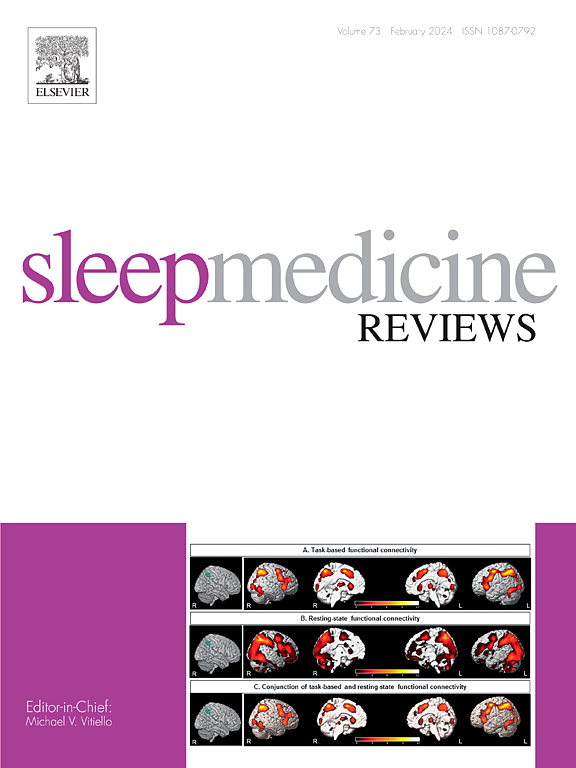时间型与物质使用障碍:一项关于昼夜节律失调对精神病理和临床病程影响的系统综述和荟萃分析
IF 9.7
1区 医学
Q1 CLINICAL NEUROLOGY
引用次数: 0
摘要
昼夜节律调节基本的生物功能,如睡眠、激素分泌、情绪调节和奖励处理。昼夜节律偏好的个体差异,即时间型,可能会影响患精神疾病的风险。具体来说,晚上偏好与情绪失调、冲动行为和奖励敏感性增加有关,这些都是物质相关疾病发展和维持的关键因素。尽管有越来越多的证据,但睡眠类型和物质使用障碍之间的关系尚未得到系统的评估。本综述旨在综合现有的临床文献,定量评估时间型与物质使用障碍之间的关系。一项系统搜索确定了临床人群中检查时间型与物质使用障碍的诊断、症状或预后特征之间联系的研究。该综述发现一致的证据表明,偏爱晚上与发病早、症状严重程度高和治疗效果差有关。荟萃分析纳入了五项研究。综合优势比显示,与早晨偏好的人相比,晚上偏好的人被诊断为物质使用障碍的可能性要高得多(综合优势比= 1.55,95%置信区间:1.20至1.95)。这些发现表明,昼夜节律偏好是评估和治疗物质使用障碍的临床相关因素。本文章由计算机程序翻译,如有差异,请以英文原文为准。
Chronotype and substance use disorder: A systematic review with meta-analysis on the impact of circadian misalignment on psychopathology and clinical course
Circadian rhythms regulate essential biological functions such as sleep, hormonal secretion, mood regulation, and reward processing. Individual differences in circadian preference, known as chronotype, may influence the risk of developing psychiatric disorders. Specifically, evening preference has been associated with emotional dysregulation, impulsive behavior, and increased reward sensitivity, which are key factors in the development and maintenance of substance-related disorders. Despite growing evidence, the relationship between chronotype and substance use disorders has not yet been systematically evaluated. This review aimed to synthesize the available clinical literature and quantitatively assess the association between chronotype and substance use disorders. A systematic search identified studies examining the link between chronotype and diagnostic, symptomatic, or prognostic features of substance use disorders in clinical populations. The review found consistent evidence that evening preference is associated with earlier onset, higher symptom severity, and poorer treatment outcomes. Five studies were included in the meta-analysis. The pooled odds ratio showed that individuals with evening preference had a significantly higher likelihood of being diagnosed with a substance use disorder compared to those with morning preference (pooled odds ratio = 1.55, 95 percent confidence interval: 1.20 to 1.95). These findings suggest that circadian preference is a clinically relevant factor in the assessment and treatment of substance use disorders.
求助全文
通过发布文献求助,成功后即可免费获取论文全文。
去求助
来源期刊

Sleep Medicine Reviews
医学-临床神经学
CiteScore
20.10
自引率
3.80%
发文量
107
期刊介绍:
Sleep Medicine Reviews offers global coverage of sleep disorders, exploring their origins, diagnosis, treatment, and implications for related conditions at both individual and public health levels.
Articles comprehensively review clinical information from peer-reviewed journals across various disciplines in sleep medicine, encompassing pulmonology, psychiatry, psychology, physiology, otolaryngology, pediatrics, geriatrics, cardiology, dentistry, nursing, neurology, and general medicine.
The journal features narrative reviews, systematic reviews, and editorials addressing areas of controversy, debate, and future research within the field.
 求助内容:
求助内容: 应助结果提醒方式:
应助结果提醒方式:


